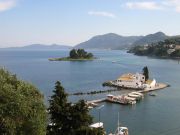On Holy Saturday morning, the three city bands again take part in the Epitaph processions of St. Spyridon Cathedral in procession with the Saint's relics. At this point the bands play different funeral marches, with the Mantzaros playingMiccheli's Calde Lacrime, the Palia playing Marcia Funebre from Faccio's Amleto, and the Capodistria playing the Funeral March from Beethoven's Eroica. This custom dates from the 19th century, when colonial administrators banned the participation of the British garrison band in the traditional Holy Friday funeral cortege. The defiant Corfiotes held the litany the following morning, and paraded the relics of St. Spyridon too, so that the administrators would not dare intervene.
The litany is followed by the celebration of the "Early Resurrection"; balconies in the old city are decked in bright red cloth, and Corfiotes throw down large clay pots (the bótides, μπότηδες) full of water to smash on the street pavement, especially in wider areas of Liston (it) and in an organised fashion. This is enacted in anticipation of the Resurrection of Jesus, which is to be celebrated that same night,and to commemorate King David's phrase: "Thou shalt dash them in pieces like a potter's vessel" (Psalm 2:9).
Once the bótides commotion is over, the three bands parade the clay-strewn streets playing the famous "Graikoí" festive march. This legendary march, the anthem of the island, was composed during Venetian rule, and its lyrics urged: "Greeks, never fear, we are all enslaved: you to the Turks, we to the Venetians, but one day we shall all be free". The Venetians were replaced by the French and the French by the British, and both the lyrics and the performance of the march were officially banned. The bands, however, defiantly played it on the Eve of Easter, as a token of the resurrection of the nation, and the tradition is honored to this day.
Musical history
While much of present-day Greece was under Ottoman rule, the Ionian Islands enjoyed a Golden Age in music and opera. Corfu was the capital city of a prized Venetian colony and it benefited from a unique musical and theatrical heritage. Then in the 19th century, as a British Protectorate, Corfu developed a musical heritage of its own and which constitutes the nucleus of modern Greek musical history. Until the early 18th century, musical life took place in city and village squares, with performances of straight or musical comedies – known as Momaries or Bobaries. From 1720, Corfu became the possessor of the first theatre in post-1452 Greece. It was the Teatro San Giacomo (now the City Hall) named after the nearby Roman Catholic cathedral (completed in 1691).
The island was also the center of the so-called Ionian School of music, the musical production of a group of Heptanesian composers, whose heyday was from the early 19th century till approximately the 1950s. It was the first school of classical music in Greece and it was a heavy influence for the later Greek music scene, after the independence.
Teatro di San Giacomo
Under Venetian rule, the Corfiotes developed a fervent appreciation of Italian opera, which was the real source of the extraordinary (given conditions in the mainland of Greece) musical development of the island during this era. The opera house of Corfu during 18th and 19th century was the Nobile Teatro di San Giacomo, named after the neighbouring Catholic cathedral; it was later converted into the City Hall. It was both the first theatre and firstopera house of Greece in modern times and the place where the first Greek opera (based on an exclusively Greeklibretto), Spyridon Xyndas' The Parliamentary Candidate was performed. A long series of local composers, such asNikolaos Mantzaros, Spyridon Xyndas, Antonio Liberali, Domenico Padovani, the Zakynthian Pavlos Carrer, the Lambeletfamily, Spyridon Samaras, and others, all developed careers intertwined with the theatre. San Giacomo's place was taken by the Municipal Theatre in 1902, which maintained the operatic tradition vividly until its destruction during German air raid in 1943.


